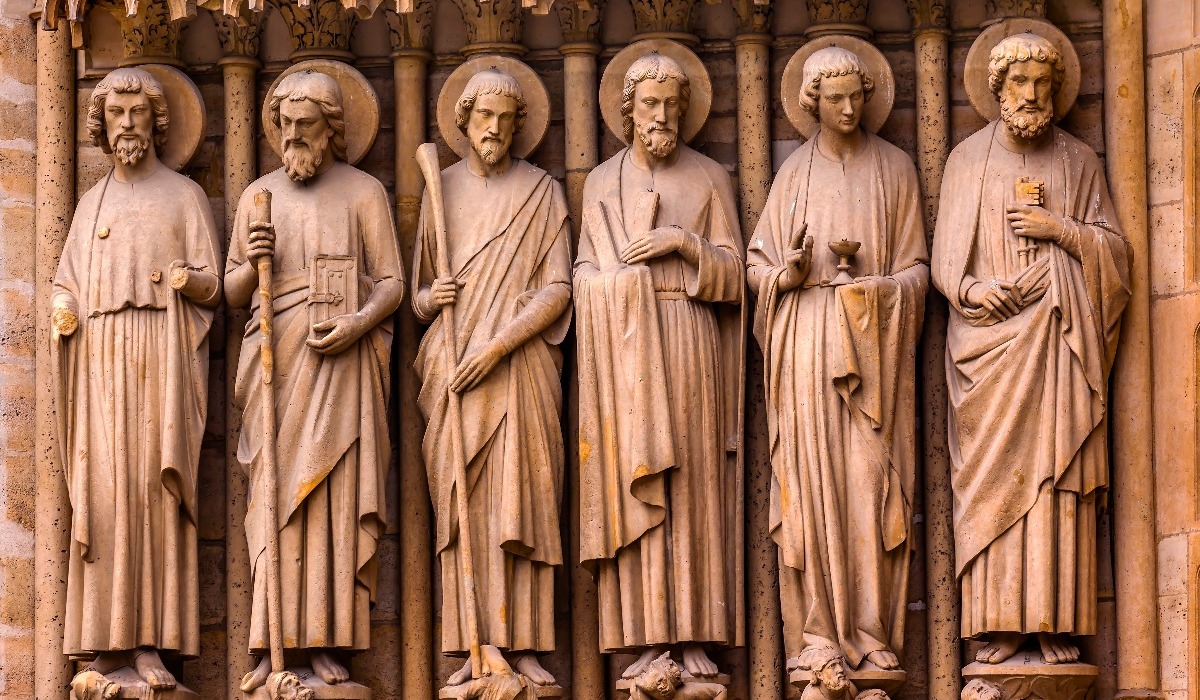One of the most crucial teachings Jesus ever preached is what is termed the greatest commandment: “You shall love the Lord, your God, with all your heart, with all your soul, and with all your mind” (Matthew 22:37).
The saints, whom the Church venerates for their lives of extraordinary discipleship, lived the greatest commandment to the fullest degree.
The saints hail from different continents, cultures, families and backgrounds. Some led ordinary lives with extraordinary virtue. Some traded lives of extreme wealth for lives of utter poverty. Some stood up to tremendous forces of evil to proclaim the name of Jesus. Some gave their lives for the faith in martyrdom.
As a church, we look to and honor the saints as an example of what it means to live a life devoted to God and his Church. Let’s explore what it means to be a saint, how one becomes a saint, why Catholics pray to saints and how they can help us on our individual walks with God.
Who is a Saint? Defining the Communion of Saints
All members of the Body of Christ, both living and dead, belong to the communion of saints. The communion of saints refers to the bond all the faithful share in Christ. The Church also distinguishes three states of the communion of saints:
- The Church on Earth
- The souls in purgatory
- The souls in heaven
The disciples on Earth are referred to as saints by way of their baptism in Christ. For the living, their sainthood is incomplete. It is through the graces of the sacraments that they are distinguished as ‘holy ones,’ meaning their souls have been marked indelibly by God. They have not reached the eternal glory of heaven, but they are given the grace to pursue holiness so they may attain it at the end of their earthly life.
The term saint is also used for those still making their journeys to heaven through the purification of purgatory. We should always remember to pray for the souls in purgatory, as they are in great need of our intercessory prayer to help them reach eternal glory. Lastly, all souls in heaven are referred to as saints, as they share in the fullness of unity with God.
The Church bestows a special distinction upon certain saints in heaven. These individuals are known as canonized saints.
What are Canonized Saints?
Canonized saints are individuals whom the Catholic Church recognizes as sharing in the eternal glory of God and are offered for public veneration and imitation.
What is Canonization?
The United States Conference of Catholic Bishops defines canonization as “the formal process by which the Church declares a person to be a saint and worthy of universal veneration.” A candidate progresses through three stages of the official canonization process: venerable, blessed and saint.
Individuals are first categorized as venerable when they are formally recognized by the pope as “having lived a heroically virtuous life” or having offered their life in martyrdom. For a person to become blessed, there must additionally be one official account of a miracle attributed to the candidate’s intercession. Lastly, for a candidate to be officially canonized a saint, the Church requires a second miracle attributed to their intercession after they are declared blessed.
The Lives of Saints: Friends For the Pilgrimage Home
Though they lived lives of extraordinary virtue, the saints are truly a lot like us. They had tempers, experienced difficult marriages, battled mental illnesses and were raised in dysfunctional families. They endured many of the same sufferings, ailments and insecurities we also face.
This fact is precisely what makes them powerful intercessors—they share in our humanity and model how to persist on the narrow path of holiness. Below are two unique examples of saints who offered themselves to God and others in extraordinary ways:
St. Maximilian Kolbe was a Franciscan priest who—along with his Franciscan brothers—hid, fed and sheltered more than 3,000 Polish refugees during the height of the Holocaust. He eventually was captured and sent to the notorious concentration camp Auschwitz for these acts of charity.
It was here he offered to take the place of another prisoner, a Jewish father and husband, condemned to death by starvation. St. Maximilian survived two weeks of attempted starvation and was eventually executed by lethal injection. The prisoner for whom Kolbe sacrificed his life, Franciszek Gajowniczek, survived Auschwitz and later attended Kolbe’s canonization Mass in 1971.
St. Mark Ji Tianxiang was a 19th century Chinese saint who spent the first half of his life as a well-off doctor. In adulthood, he suffered from a serious stomach illness. He treated himself with opium, which he became addicted to. He persisted in the faith and remained close to the sacrament of reconciliation; however, his confessor stopped granting him absolution for repeatedly confessing the same sin.
This led to 30 years away from the sacraments. Nevertheless, St. Mark persevered in his faith and his desire for holiness.In 1900 the Boxer Rebellion spread through China and began a wave of Christian persecution. St. Mark was captured and beheaded for his Catholic faith. It is recorded that he sang the Litany of the Blessed Virgin Mary as he was executed. Despite being denied the sacraments, St. Mark Ji Tianxiang died a martyr for his faith.
The Powerful Intercession of Saints: How Their Prayers Can Help Us Achieve Virtue
Because of their relatable humanity, we can identify with certain saints at specific times in our lives. These saints can intercede for us in our time of need, and we can ask them to lift us up in intercessory prayer.
For example, an individual battling addiction may turn to St. Mark Ji Tianxiang and ask for his intercession for the courage to overcome the addiction and persist in holiness.
The Catechism of the Catholic Church paragraph 2683 states: “The witnesses who have preceded us into the kingdom, especially those whom the Church recognizes as saints, share in the living tradition of prayer by the example of their lives, the transmission of their writings, and their prayer today. They contemplate God, praise him and constantly care for those whom they have left on earth. … Their intercession is their most exalted service to God's plan. We can and should ask them to intercede for us and for the whole world.”
The saints unceasingly intercede for us still journeying on Earth. We should turn to them as trusted companions and powerful intercessors.
Let us always remember to pray for the deceased members of the communion of saints so that they may receive the merits of our intercession and that they will also remember to pray for us when they reach eternal glory
Consider lifting up your loved one in prayer by requesting a Mass on their behalf. You can fill out this Mass request form to have the Holy Mass celebrated by Divine Word Missionaries for your specific intention.










